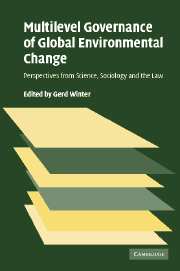 Multilevel Governance of Global Environmental Change
Multilevel Governance of Global Environmental Change Book contents
- Frontmatter
- PREFACE
- Contents
- List of figures
- List of tables
- Notes on contributors
- List of abbreviations
- 1 Introduction
- PART I Earth system analysis
- PART II Society and institutions of global; environmental change
- PART III Self-regulation of industry and the law
- PART IV The potential of the state
- PART V The potential of world regions
- PART VI Formation and implementation of international regimes
- PART VII Improving the instruments of global governance
- 18 Regulatory competition and developing countries and the challenge for compliance push and pull measures
- 19 Policy instrument innovation in the European Union: a realistic model for international environmental governance?
- 20 Financial instruments and cooperation in implementing international agreements for the global environment
- PART VIII Fundamental concepts of institutionalising common concern
- Index
20 - Financial instruments and cooperation in implementing international agreements for the global environment
Published online by Cambridge University Press: 04 May 2010
- Frontmatter
- PREFACE
- Contents
- List of figures
- List of tables
- Notes on contributors
- List of abbreviations
- 1 Introduction
- PART I Earth system analysis
- PART II Society and institutions of global; environmental change
- PART III Self-regulation of industry and the law
- PART IV The potential of the state
- PART V The potential of world regions
- PART VI Formation and implementation of international regimes
- PART VII Improving the instruments of global governance
- 18 Regulatory competition and developing countries and the challenge for compliance push and pull measures
- 19 Policy instrument innovation in the European Union: a realistic model for international environmental governance?
- 20 Financial instruments and cooperation in implementing international agreements for the global environment
- PART VIII Fundamental concepts of institutionalising common concern
- Index
Summary
Introduction
Over the past thirty years, the effects of global environmental threats have become more and more significant. It also became obvious that the threat to the environment coincides with a development strategy which is based on the consumption of global goods to an extent that brings these resources to the edge of extinction, irreversible pollution, or destruction. In order to avoid further deterioration of the global ecosystems, not only do consumption patterns in the North have to change, but the South needs to be assisted in pursuing a line of development that avoids the destructive pattern of industrialisation adopted in the developed parts of the northern and western hemispheres.
Developing countries are also more vulnerable to global change and are more frequently exposed to the negative impacts of environmental deterioration. They have weaker economies and institutions, limited access to capital and information and therefore less capacity to bear the shock, to respond, or to adapt to global change. Also, poverty reduction and intragenerational equity (as compared to intergenerational equity) are the overriding concerns of developing countries. Even if pollution may be lower in absolute terms in developing countries than in more highly developed ones, mitigation costs are high relative to the ability of developing countries to pay.
The South, by voicing its concerns about equity and the right of development at the UN Conference on Environment and Development (UNCED), held in 1992 in Rio de Janeiro, helped the international community to recognise that the restraints posed by a narrow definition of interest must be loosened to allow for a broader understanding of interdependence and responsibility.
- Type
- Chapter
- Information
- Multilevel Governance of Global Environmental ChangePerspectives from Science, Sociology and the Law, pp. 493 - 516Publisher: Cambridge University PressPrint publication year: 2006


